ESP32-C3 DevKitM 1 Dual USB
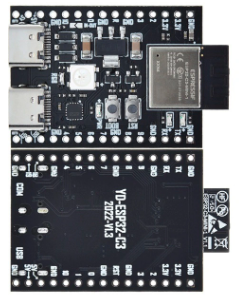
Mô tả
- MCU: ESP32-C3
- Có 2 cổng USB Type C:
- Cổng USB có chữ COM, đã được chuyển đổi thành Serial, dùng để nạp code và giao tiếp với máy tính như các loại Dev-Kit khác
- Cổng USB có chữ USB, dạng native, dùng để biến Dev-Kit thành thiết bị dạng HID kết nối với máy tính
- Ưu điểm nổi bật: cho phép debug step-by-step mà không cần thiết bị bổ trợ. Đã thử nghiệm thành công với Visual Studio Code.
Lập trình
- Ngôn ngữ lập trình:
- Công cụ lập trình: Arduino IDE, Visual Studio Code + PlatformIO
- Nút bấm BOOT có trên board được nối sẵn ở GPIO9
- LED RGB được nối sẵn ở GPIO8
- Có 2 đèn led đơn sắc tích hợp sẵn tren board, ở 2 chân TX, RX, đồng thời có thể dùng độc lập
- Nạp code mà không cần bấm tổ hợp 2 nút RST và BOOT
#define BOOT_BUTTON_PIN 9 # Nút bấm Boot để nạp nạp code khi khởi động, hoặc cho mục đích tùy ý sau đó
#define LEDRGB_PIN 8 # Đèn LED 3 màu WS2812
#define TX_PIN 21 # Chân TX mặc định, kèm đèn led đỏ
#define RX_PIN 20 # Chân TX mặc định, kèm đèn led xanh
#define RED_LED_PIN 21 # Chân TX mặc định, kèm đèn led đỏ
#define BLUE_LED_PIN 20 # Chân TX mặc định, kèm đèn led xanh
#define LED_TURNON LOW # Đèn led RED, BLUE tích cực mức thấp
#define LED_TURNOFF HIGH # Đèn led RED, BLUE tích cực mức thấp
Với Arduino IDE:
- Chọn board: ESP32C3 Dev Module
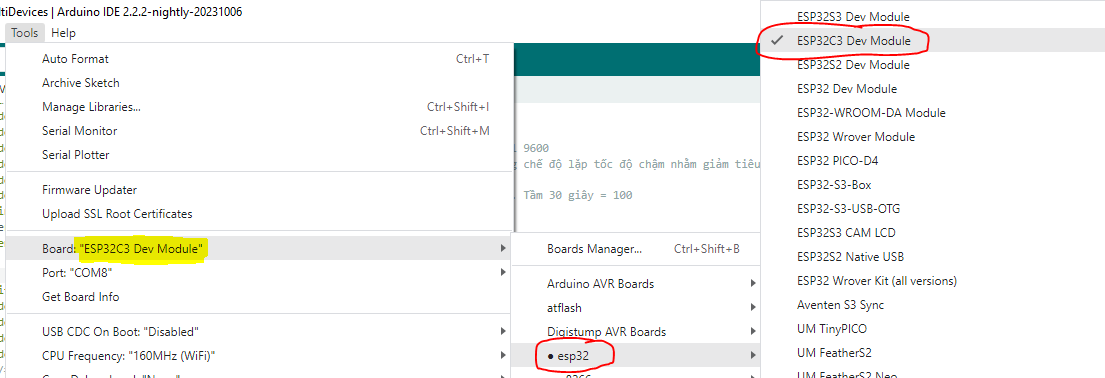
Với Visual Studio Code
- Chọn board: esp32-c3-devkitm-1

-
Cấu hình PlatformIO\
```yaml [env:esp32-c3-devkitm-1] build_type = debug platform = espressif32 board = esp32-c3-devkitm-1 framework = arduino debug_tool = esp-builtin monitor_speed = 115200
Thông số chi tiết
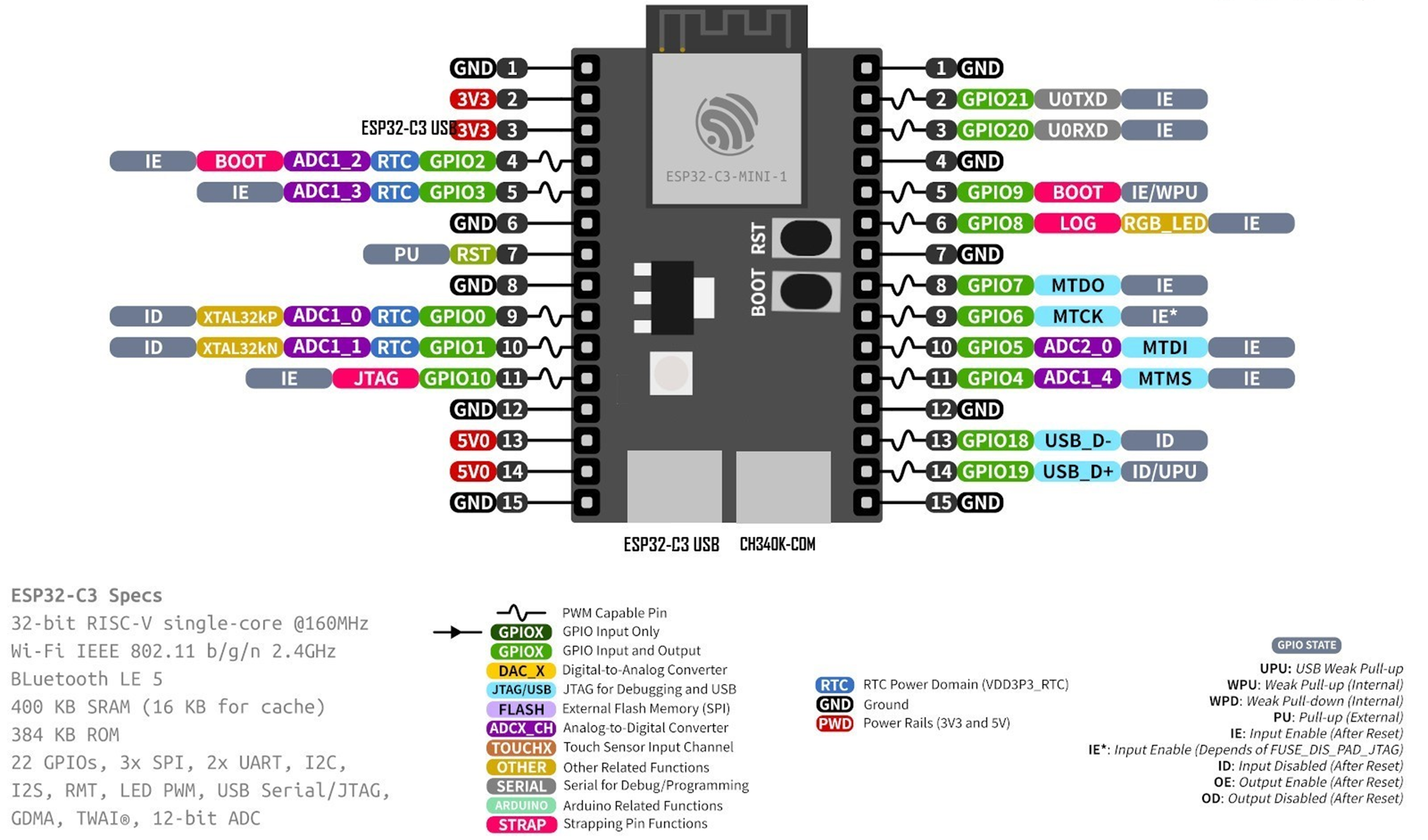
Demo với SPI
Thử nghiệm thành công việc đổi các chân pin SPI để chứng minh rằng ESP32-C3 có thể tùy ý lây bất cứ chân nào làm SPI.
Ví dụ cách 1:
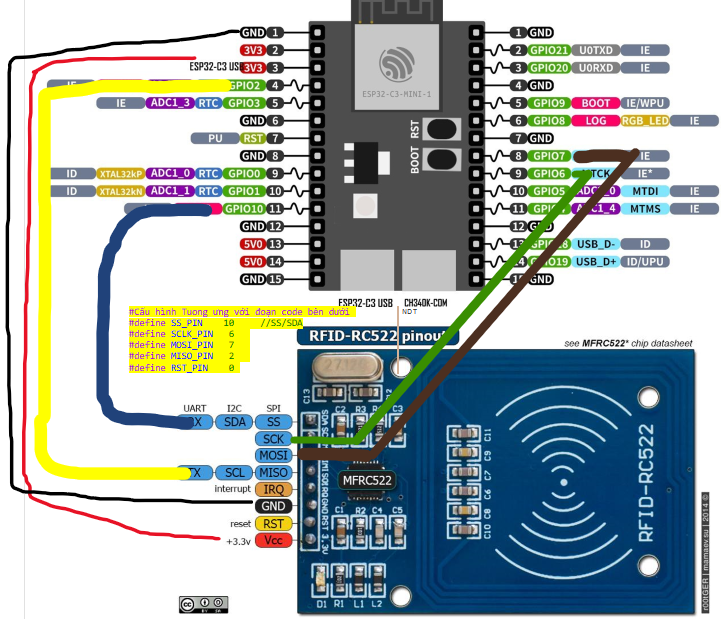 Ví dụ cách 2:
Ví dụ cách 2:
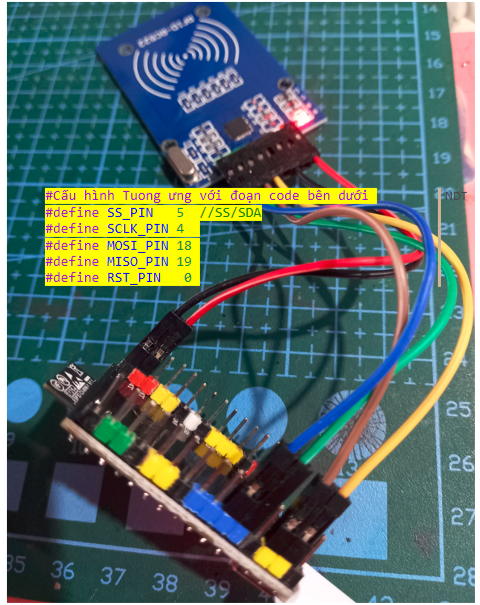
Chú ý:
- Chân Reset của SPI không quan trọng. Đăt = 0 la được
- Nếu 1 chân của SPI bị lỏng và rụng ==> thì phải reset lại toàn bộ thiết bị SPI bằng cách reboot lại bo mạch chính
- Nếu đèn nguồn D1 màu đỏ tren RC522 bị sáng mờ thì cũng có nghia là bị lỏng chân, phải reboot lại bo mạch chính
Cấu hình board PlatformIO\
[env:esp32-c3-devkitm-1]
build_type = release
platform = espressif32
board = esp32-c3-devkitm-1
framework = arduino
debug_tool = esp-builtin
monitor_speed = 115200
lib_deps =
miguelbalboa/MFRC522@^1.4.10
Code mẫu:\
```C
#include <Arduino.h>
#include <SPI.h>
#include <MFRC522.h>
// Các tổ hợp vị tri SPI đã thử thành công
#define SS_PIN 5 // 19 // 19 // 10 //SS/SDA
#define SCLK_PIN 4 // 18 // 18 // 6
#define MOSI_PIN 18 // 5 // 5 // 7
#define MISO_PIN 19 // 4 // 4 // 2
#define RST_PIN 0 // 0 // 0 // 0
MFRC522 rfid(SS_PIN, RST_PIN); // Instance of the class
MFRC522::MIFARE_Key key;
// Init array that will store new NUID
byte nuidPICC[4];
/**
* Helper routine to dump a byte array as hex values to Serial.
*/
void printHex(byte *buffer, byte bufferSize) {
for (byte i = 0; i < bufferSize; i++) {
Serial.print(buffer[i] < 0x10 ? " 0" : " ");
Serial.print(buffer[i], HEX);
}
}
/**
* Helper routine to dump a byte array as dec values to Serial.
*/
void printDec(byte *buffer, byte bufferSize) {
for (byte i = 0; i < bufferSize; i++) {
Serial.print(buffer[i] < 0x10 ? " 0" : " ");
Serial.print(buffer[i], DEC);
}
}
void setup() {
Serial.begin(9600);
//SPI.begin(); // Init SPI bus
SPI.begin(SCLK_PIN, MISO_PIN, MOSI_PIN, SS_PIN);
rfid.PCD_Init(); // Init MFRC522
for (byte i = 0; i < 6; i++) {
key.keyByte[i] = 0xFF;
}
Serial.println(F("This code scan the MIFARE Classsic NUID."));
Serial.print(F("Using the following key:"));
printHex(key.keyByte, MFRC522::MF_KEY_SIZE);
}
void loop() {
// Reset the loop if no new card present on the sensor/reader. This saves the entire process when idle.
if ( ! rfid.PICC_IsNewCardPresent())
return;
// Verify if the NUID has been readed
if ( ! rfid.PICC_ReadCardSerial())
return;
Serial.print(F("PICC type: "));
MFRC522::PICC_Type piccType = rfid.PICC_GetType(rfid.uid.sak);
Serial.println(rfid.PICC_GetTypeName(piccType));
// Check is the PICC of Classic MIFARE type
if (piccType != MFRC522::PICC_TYPE_MIFARE_MINI &&
piccType != MFRC522::PICC_TYPE_MIFARE_1K &&
piccType != MFRC522::PICC_TYPE_MIFARE_4K) {
Serial.println(F("Your tag is not of type MIFARE Classic."));
return;
}
if (rfid.uid.uidByte[0] != nuidPICC[0] ||
rfid.uid.uidByte[1] != nuidPICC[1] ||
rfid.uid.uidByte[2] != nuidPICC[2] ||
rfid.uid.uidByte[3] != nuidPICC[3] ) {
Serial.println(F("A new card has been detected."));
// Store NUID into nuidPICC array
for (byte i = 0; i < 4; i++) {
nuidPICC[i] = rfid.uid.uidByte[i];
}
Serial.println(F("The NUID tag is:"));
Serial.print(F("In hex: "));
printHex(rfid.uid.uidByte, rfid.uid.size);
Serial.println();
Serial.print(F("In dec: "));
printDec(rfid.uid.uidByte, rfid.uid.size);
Serial.println();
}
else Serial.println(F("Card read previously."));
// Halt PICC
rfid.PICC_HaltA();
// Stop encryption on PCD
rfid.PCD_StopCrypto1();
}
Demo với I2C
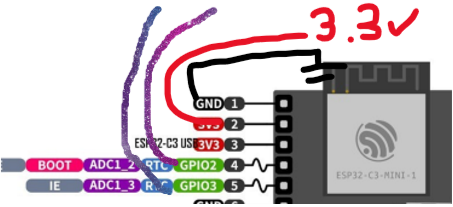
Porting trong mã nguồn như sau\
// Giao tiếp I2C
#define I2C_SCL 2
#define I2C_SDA 3
void setup() {
Wire.begin(I2C_SDA, I2C_SCL);
}